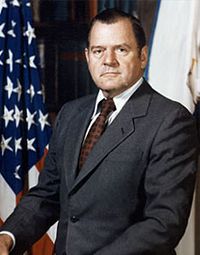Charles W. Duncan
| Charles William Duncan Jr. | |
|---|---|
 |
|
| 2nd United States Secretary of Energy | |
|
In office August 24, 1979 – January 20, 1981 |
|
| President | Jimmy Carter |
| Preceded by | James R. Schlesinger |
| Succeeded by | James B. Edwards |
| United States Deputy Secretary of Defense | |
|
In office January 31, 1977 – July 26, 1979 |
|
| President | Jimmy Carter |
| Preceded by | Bill Clements |
| Succeeded by | W. Graham Claytor Jr. |
| Personal details | |
| Born |
September 9, 1926 Houston, Texas |
| Nationality | American |
| Political party | Democratic |
| Spouse(s) | Anne Smith Duncan |
| Relations | John H. Duncan, brother |
| Children | Charles William Duncan III and Mary Anne Duncan Dingus |
| Residence | Houston, Texas |
| Alma mater |
Rice University University of Texas-Austin |
| Military service | |
| Allegiance |
|
| Service/branch |
United States Army Air Corps |
| Battles/wars | World War II |
Charles William Duncan Jr. (born September 9, 1926) is an American entrepreneur, administrator, and statesman best known for serving as U.S. Secretary of Energy on the Cabinet of President Jimmy Carter from 1979 to 1981. He had previously served as Carter's United States Deputy Secretary of Defense during the Iranian Revolution. Earlier, Duncan had run the family business, Duncan Coffee Company of Houston, Texas, for seven years, until the Coca-Cola Company acquired it in 1964. After seven years on the Coke board, Duncan became the corporation's president.
A native of Houston, he served two years in the U.S. Army Air Corps and then graduated from Rice University in 1947 with a degree in chemical engineering. Duncan also pursued two years of graduate work in business administration at the University of Texas and worked briefly as a roustabout and chemical engineer for Humble Oil and Refining Corporation (now Exxon).
In 1957 Duncan joined his family’s coffee business, which had been founded by his uncle and father in 1918. Duncan Coffee’s early brands, notably Admiration and Bright & Early, had become grocery staples in Texas and surrounding states. Duncan rose steadily through the ranks and attained the presidency in 1958, when he was 31. Under his leadership, the company expanded into the production of instant coffee—a new and popular beverage—by acquiring plants in New Jersey and Pennsylvania. Duncan also acquired several regional brands of ground coffee, including Butternut Foods of Nebraska and Fleetwood Coffee of Tennessee. Most importantly, he developed Maryland Club Coffee, which was marketed as a premier, upscale blend rivaling Maxwell House. The company’s print ads featured an elegantly dressed model, brunette Elsa Rosborough, who became known as Miss Maryland Club.
On May 8, 1964, Duncan Coffee merged with the Coca-Cola Company, and Charles Duncan joined the Coke board. He ran the newly formed Coca-Cola Foods Division, which included the coffee and citrus (Minute Maid) divisions of Coke. Three years later the company dispatched him to London to serve as chairman of Coca-Cola Europe. There Duncan supervised the operation and expansion of almost 300 Coca-Cola bottling plants throughout Europe and Asia, including ones in Eastern Europe, Southwest Asia, and North Africa. The first Eastern Europe introduction into Bulgaria made The Coca-Cola Company the first U.S. consumer marketing company to penetrate the Iron Curtain.
...
Wikipedia
